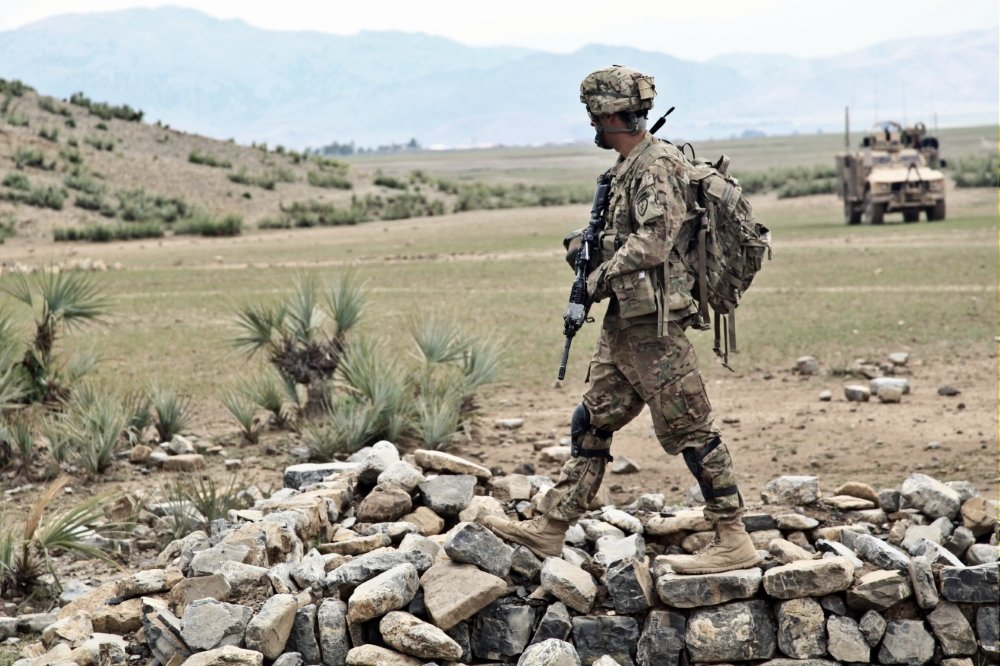“I’m now the fourth United States president to preside over American true presence in Afghanistan; two Republicans, two Democrats. I will not pass this responsibility onto a fifth.” So intoned President Joe Biden in a speech marking the potential end of the War in Afghanistan on the 20th anniversary of 9/11. Had Donald Trump won his second term, the war would have ended in May, instead of September.
As the “war on terror” raged across the globe during the last 20 years, it affected life all around us, from air travel to the so-called “Arab Spring,” to the rise of China. More than 2,500 American men and women died stabilizing Afghanistan. More than 20,000 were wounded and maimed. If you count British and North Atlantic Treaty Organization members, that figure increases to around more than 4,000 dead, and double the number of wounded.
Those of a certain age will remember more than 100 British soldiers died in Helmand alone in the last decade. It is currently a Taliban stronghold.
One of the first countries to give aid to “liberated” Afghanistan was India. That generosity was paid back by a Taliban attack on the consulate with Indian police trainers dead among them. That was in 2008.
As is sadly too often the case when we stare at cold statistics, we can forget that all of those who perished in the War in Afghanistan — Americans, Canadians, Australians, Europeans, Indians, and British, among others — had families. Some didn’t get to marry and have children before they died. Trillions of taxpayer dollars were spent.
I spoke to Will Ruger, a professor of international relations, President Trump’s nominee for ambassador to Afghanistan, and an advocate for a pullout from Afghanistan and the greater Middle East. Ruger is also a veteran who was stationed in Kabul and focused on Regional-Command South, which at that time encompassed the Taliban strongholds of Kandahar, Helmand, and Nimruz.
“The argument for a thoroughgoing policy shift — a speedy and full military withdrawal from the war — stands on its merits regardless of who makes it and what their prior experience is,” Ruger said with the characteristic reticence of a veteran, “but I’d also say that my experience there certainly has helped inform how I think about the war, the country, and the culture.”
The hopeful wait for an Afghan James Madison proved elusive. There was nothing conservative about a utopian mission to turn a feudal region into a liberal democracy. In fact, that idea is as revolutionary and ideological as it gets. Ruger puts it thusly:
Conservatives should learn that what we’ve been saying for decades about domestic policy is also applicable to foreign policy. Namely, that we ought to have humility about big government ‘solutions’ to pressing problems; what is more big government and hubristic than trying to nation-build in and reshape the culture of a far-away country like Afghanistan that is so foreign to us in so many ways? … I hope that conservatives reject the Bush-era vision, and it’s callow idealism, in favor of a more hard-headed realism that counsels strategic restraint in how we conduct our foreign policy. This will be good for conservatism and great for our country.
Back in 2001, the first Harry Potter film was the highest-grossing film, iTunes was launched, and Billie Eilish was born. Twenty years might be a blip in history, but it’s a quarter of an average human life. Yet Afghanistan remained the same.
It was the same when the British empire retreated from Kabul in 1842, realizing that, unlike other parts of the globe that had some coherent form of civilization, Afghanistan had none, and as a result, had little chance of any genuine improvement. Upon their exit, the British kept a wary eye on the region and on the potential Russian imperial invasion that never came. The empire often took punitive counter-insurgency operations against tribal rebels, but never tried to occupy or pacify the proud region ever again (there are archival photos of the British-Indian air force bombing Afghan rebels in 1937).
Nearly a century passed, and the Russians ultimately came. In 1979, after a decade of flying high with anti-colonial puppet governments in Africa and the American retreat from Vietnam, there was no place on earth that wasn’t ready for the Red Banner. That also not only ended in retreat, but the collapse of the Soviet Empire, hollowed out from within, wasting blood and treasure in a region that took everything thrown at it and only gave corpses in return.
Forty years since the Soviet invasion, it was Americans’ turn to learn the same lessons of all great powers who venture into Afghanistan. This time, instead of civilizing Afghans with communism, it would be with liberalism and human rights.
Hundreds of non-governmental organizations propped up to ensure women’s empowerment in a land that had just recently shelled centuries-old Bamiyan Buddhas a few short years before. The young civilizational power once full of optimism and idealism then grew up, becoming jaded and cynical, like the older powers before her. Such is the inevitable course of history. Trough it all, Afghanistan didn’t change.
Enough. There are some typical reactions about the withdrawal from those such as Sen. Lindsey Graham and columnist Max Boot. “Don’t believe a word of it,” Jacob Heilbrunn, editor in chief of the Center For the National Interest, relays. “Biden, in acknowledging that Afghanistan was a lost cause long before he ever became president, is bowing to the inevitable.”
The neoconservatives and the bleeding-heart humanist liberals can still organize a Facebook group (note: Facebook wasn’t there when the war started), pick up some old AK-47s, and head to Afghanistan to fulfill their fantasies of fighting tyranny and establishing feminism. No one’s stopping them.
But normal people shouldn’t be asked or expected to take on this kind of thankless imperial burden. The Americans and others who died alongside them were admirable — they went to war when the bugle sounded. But this isn’t Oddball on a Sherman tank in “Kelly’s Heroes,” heroically in front of a column as “The Battle Hymn of the Republic” plays in the background. That war had a clear enemy and an end game, a total war where you survive or perish.
If America and the West are attacked in another great-power war, men and women like them would still rally around the flag. But this is dusty death in a feudal region that will never change from external influence. It might change someday, but if it does, that evolution must come from within.
The real lesson from a story of another mighty hegemon with 21st-century egalitarian ideas stemming from Lockean enlightenment is the chastening in the hands of seventh-century feudalism, natural hierarchy, and geography. America, at its peak, ended up following the British and Soviet Empires at their peaks.
After an idealistic attempt to shape the history of the region, American leadership found out what major powers across centuries had also learned the hard way: culture and tradition are the major determinant factors in the history of a region, not blank-slate ideology or naïve faith in secular humanist liberalism.
Remember the British policy of punitive raids and wary eyes from a distance. The real lesson of Afghanistan isn’t that war is bad — sometimes, it is necessary. Frankly, the lesson isn’t even just about Afghanistan. It’s about destructive idealism and the cautionary tale of the painful maturation of a republic that’s still young but increasingly tired.













